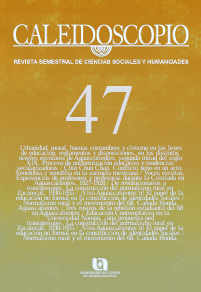The House-Workshop and the Workshop-Network: Productive Flexibility in the Garment Industry of Moroleón and Uriangato, Guanajuato
DOI:
https://doi.org/10.33064/47crscsh3711Keywords:
formal-informal work, flexibility, networkAbstract
The article exposes the processes of productive flexibility in the clothing industry of Moroleón and Uriangato, Gto. The subject is approached through the analysis of the "house-workshop", which are domestic spaces located inside the homes of these localities. Garments are made there, either maquila or designs made by the families themselves. This form of organization allows us to observe the combination of different production dynamics where elements of formal and informal work come together that allow us to weave relationships that articulate them as network companies. Such collaborations are not established permanently, but there is a variation of types and intensities, as required. This case shows on one hand, how this allows to achieve productive relationships with companies and clothing brands of greater dimension. On the other hand, the way in which this relationship is constitutive of the forms of accumulation of contemporary capitalism is explained.
Downloads
References
Artiles, A. (1995). Flexibilidad y relaciones laborales. Estrategias empresariales y relaciones laborales. Consejo Económico Social.
Bensunsán, G. (1992). Las relaciones laborales y el Tratado de Libre Comercio. Universidad Autónoma Metropolitana; Porrúa.
Godelier, M. (1998). El Enigma del Don. Paidós.
Maza, O., y Valadez Montes, M. (2020). El lugar sin límites, la constitución de la casa-tallerLos casos de Moroleón y Uriangato, Guanajuato, México. Antrópica. Revista de Ciencias Sociales y Humanidades, 6(12), 107–128. https://antropica.com.mx/ojs2/index.php/AntropicaRCSH/article/view/235/406
Maza, O. y Ortiz, D. (Eds.). (2015). En el mismo barco. Reflexiones sobre la producción, el trabajo y las redes sociales: El Caso de Uriangato, Guanajuato. Universidad Autónoma de Aguascalientes.
Ortiz, A. (1994). Política Económica de México. 1982-1994. Nuestro Tiempo.
Piore, M. (1990). La segunda ruptura industrial.Alianza.
Vangstrup, U. (1995). Moroleón: la pequeña ciudad de la Gran Industria . Espiral. Estudios Sobre Estado y Sociedad, 2(4), 101–134. http://148.202.18.157/sitios/publicacionesite/pperiod/espiral/espiralpdf/espiral4/101-134.pdf
Vangstrup, U. (2007). Centros de Servicios Empresariales y la Competitividad de un Cluster Industrial: El caso de la Industria de prendas de vestir de Moroleón y Uriangato, Guanajuato. En M. Estrada, y P. Labazée, Globalización y Localidad: Espacios, Actores, Movilidades e Identidades (pp. 185–210). CIESAS.
Wilson, F.(1990). De la casa al taller. El Colegio de Michoacán.
Downloads
Published
How to Cite
Issue
Section
License
Copyright (c) 2022 Marisa Josefina Valadez Montes

This work is licensed under a Creative Commons Attribution-NonCommercial-ShareAlike 4.0 International License.
Licencia Creative Commons Atribución-NoComercial-CompartirIgual 4.0 Internacional
El lector es libre de compartir o adaptar el material en cualquier medio o formato bajo las condiciones siguientes: (a) debe reconocer adecuadamente la autoría, proporcionar un enlace a la licencia e indicar si se han realizado cambios; (b) no puede utilizar el material para una finalidad comercial y (c) si remezcla, transforma o crea a partir del material, deberá difundir sus contribuciones bajo la misma licencia que el original.
Resumen de la licencia
https://creativecommons.org/licenses/by-nc-sa/4.0/deed.es_ES
Texto completo de la licencia
https://creativecommons.org/licenses/by-nc-sa/4.0/legalcode
Cada autor es responsable del contenido de su artículo. En el caso de un texto colectivo, el primer autor asume la responsabilidad intelectual de los resultados del proceso editorial; los autores son responsables de obtener la licencia de autor para reproducir materiales gráficos o fotográficos que pertenecen a terceros.
Los autores asumen plena responsabilidad en el caso de falsificación de datos o falta de autenticidad en la investigación. Se comprometen, también, a no reutilizar trabajos ya publicados, total o parcialmente, para presentarlos en otra publicación.
Estas condiciones aplican tanto a la versión impresa como a la versión electrónica de la revista.


















